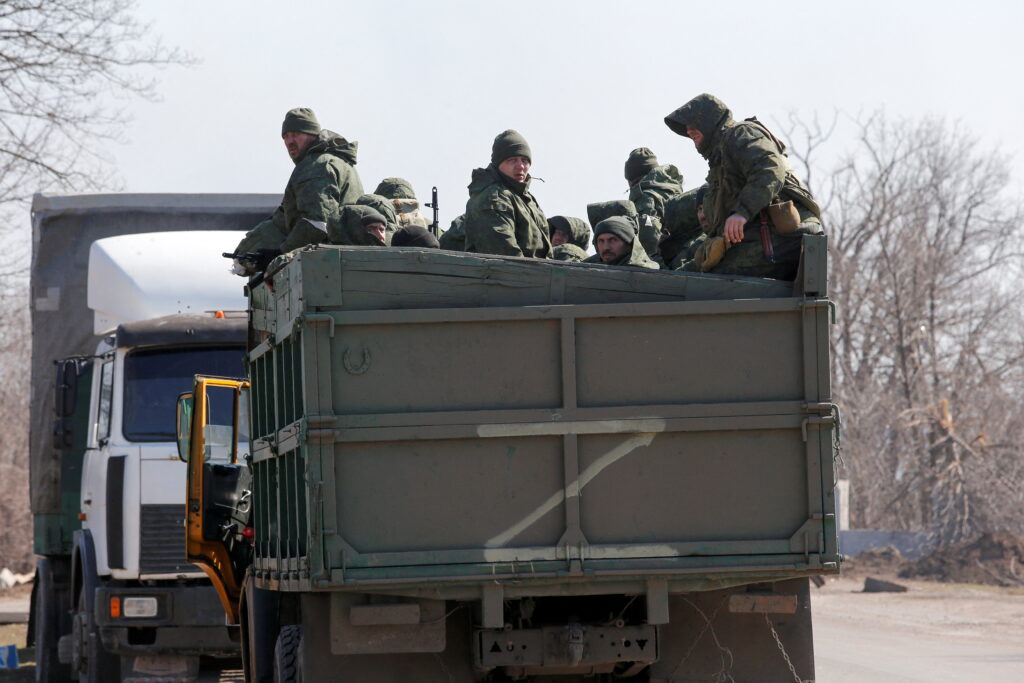 |
| Pro-Russian troops are seen in the body of a truck near the besieged southern port city of Mariupol, Ukraine. Photo by Reuters. |
Ukraine defied a Russian demand that its forces lay down arms before dawn on Monday in Mariupol, where hundreds of thousands of civilians have been trapped in a city under siege and already laid to waste by Russian bombardment.
Russia’s military had ordered Ukrainians inside the city in the country’s southeast to surrender by 5 am, saying those who did so would be permitted to leave, while those who stayed would be turned over to tribunals run by Russian-backed separatists.
“There can be no question of any surrender, laying down of arms” in Mariupol, Ukrainian Deputy Prime Minister Iryna Vereshchuk responded.
Russia’s assault on Ukraine, now in its fourth week, has stalled along most fronts. Moscow has failed to seize a single major Ukrainian city much less capture the capital Kyiv or swiftly topple the government of President Volodymyr Zelenskiy.
But Russia has pounded residential areas, causing massive destruction. Nowhere has suffered worse than Mariupol, a port on the Sea of Azov, home to 400,000 people before the war. It has been under siege and constant bombardment, with no food, medicine, power or fresh water, since the invasion’s early days.
Ukrainian Defence Minister Oleksii Reznikov praised the city’s “heroic defenders”, saying that by continuing to hold out they had helped thwart Russia’s march on other big cities across the country.
“By virtue of their dedication and superhuman courage, tens of thousands of lives throughout Ukraine were saved. Today Mariupol is saving Kyiv, Dnipro and Odesa.”
A part of Mariupol now held by Russian forces, reached by Reuters on Sunday, was an eerie apocalyptic wasteland. Several bodies lay by the road, wrapped in blankets. Windows were blasted out of the surrounding apartment blocks and walls were charred black. People who had come out of their basements sat on benches amid the debris, bundled up in coats..
A group of men were digging graves in a patch of grass by the roadside.“The military told us to put the bodies somewhere in the cold,” said Andrei, who hoped the bodies would one day be moved to a proper cemetery. A 70-year-old neighbour had just died. They had buried her 45-year-old son two days before.
In one dark cellar packed with families, Irina Chernenko, a university librarian, said she had been there for 11 days.
“The apartment is destroyed. Everything is destroyed. Where can we go?” she said. “We’re cooking over a fire – for now we still have a bit of food and some firewood. In a week we will have nothing, no food at all. What should we do?”
‘IT’S HARD FOR ME TO SPEAK’
Russia calls the war, the biggest attack on a European state since World War Two, a “special military operation” to disarm Ukraine and protect it from “Nazis”. The West calls this a false pretext for an unprovoked war of aggression to subdue a country President Vladimir Putin describes as illegitimate.
Nearly a quarter of Ukraine’s 44 million people have already been driven from their homes, including 3.4 million who have fled abroad, according to the United Nations, one of the fastest exoduses ever recorded. A UN tally includes more than 900 confirmed civilian deaths but the true total is unknown.
Thousands of Russian and Ukrainian troops have died, and Russia’s artillery-heavy army has suffered large losses in tanks and armour. Five Russian generals have already been killed, a loss of senior commanders in such a short period almost unheard of in modern warfare.
In Kyiv, six bodies were laid out on the pavement by a shopping mall that had been struck overnight by Russian shelling. Emergency services combed through the wreckage to the sound of distant artillery fire.
Firefighters were putting out small blazes around the smouldering carcass of the building, looking for possible survivors. Ukraine’s Prosecutor General said at least eight people had been killed in the shelling.
“It is hard for me to speak because my child worked here. She was at work just yesterday,” said tearful onlooker Valentina Timofeyevna.
Officials imposed a day-and-a-half curfew in the capital from Monday night. While suburbs in the path of Russia’s advance have been reduced to rubble, defenders have prevented Kyiv itself from coming under a full-scale assault. However, it has been subjected to deadly shelling and missile strikes nightly.
TALKS RESUME
Ukrainian officials hope that Moscow, having failed to secure a quick victory, will cut its losses and negotiate a withdrawal. Both sides hinted last week at progress in talks on a formula which would include some kind of “neutrality” for Ukraine, though details were scarce.
Talks resumed on Monday, starting with a 90-minute video conference. Working groups from the two sides will continue discussions throughout the day, David Arakhamia, a member of the Ukrainian delegation, was quoted as saying by Ukrainian media.
Apart from Mariupol, the eastern cities of Kharkiv, Sumy and Chernihiv have been hardest hit by Russia’s tactic of flattening urban areas with artillery.
Kharkiv Mayor Igor Terekhov said hundreds of buildings, many of them residential, have been destroyed in the country’s second largest city.
“The city is united…Kharkiv will survive,” Terekhov said, describing hundreds of buildings destroyed. “It is impossible to say that the worst days are behind us, we are constantly being bombed, there was shelling again overnight.”
European Union foreign and defence ministers meet on Monday to discuss imposing further sanctions on Moscow, especially whether to introduce an embargo on Russia’s lucrative oil and gas sector.
International sanctions have cut Russia off from the global financial system to a degree never before imposed on such a big economy. But Europe, Russia’s main customer for energy, has so far made an exception for Russian exports of oil and gas.
REUTERS
